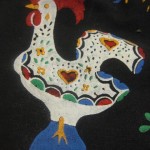Dear discriminating readers:
What are your thoughts about these attempts to tell fictional stories via unusual online means:
1. Sumedicina: “Data fiction project. Story telling with information graphics.” (Via Listenerd.)
2. Mr. Plimpton’s Revenge: “A Google Maps Essay, in Which George Plimpton Delivers My Belated and Well-Deserved Comeuppance.” (Actually, as the title indicates, a literary essay. Also via Listenerd.)
3. Dreaming Methods: “A fusion of writing and new media exploring imaginary memories and dream-inspired states.” (Via MetaFilter)
4. Love Begins A Picture: “Google Voice transcriptions formatted and annotated as poetry.” (Also not actually fiction, and maybe doesn’t belong here at all, but sort of interesting and also from that same Listenerd post that brought this up in the first place.)
Do you like any of these? Which ones? Why? Do you like the concept, or the story itself, or both?
I’m just curious.






I think it’s a fabulous idea. I’m a teacher and will be sharing some of these with my students as new options for publication of their writing; I think they’ll find them fascinating.
I’ve proven myself to not be very discriminating, so I don’t know if I’m qualified to answer? I liked the Plimpton essay best. I think the novelty of it would wear off fairly quickly, though. The format of the Sumedicina thing was good, but I feel like it needed to be a more controlled aesthetic experience. More like the little I have experienced at Dreaming Methods was. (The link in the post is wonked out right now.)
On a tangential note: I haven’t followed sig-o that closely, but have you had, or considered having, multiple, conflicting stories about single objects? It seems like a fun gimmick.
Josh of course you’re qualified! I pretty much stole this entire topic from you, after all. I’ve now fixed the Dreaming Methods link — that’s for pointing out the problem there.
I think you’re right about the novelty wearing off quickly. With things like that Plimpton essay, once it’s been done, why do anything like that again?
Re multiple stories/one object — that’s come up, we haven’t done it, but there’s something coming up later in v3 that … well that I guess I can’t actually explain without ruining the surprise.
Alison, thanks for that and I hope they find it all interesting…
I really enjoyed these narrative variations, but I am quite drawn to the use of form and structure in creating stories. Dinty Moore’s Plimpton essay was very successful; I loved it. I’ll bet there will more narratives using that form, each with their own flavor. Just because it’s been done once, doesn’t mean that someone won’t want to try their hand writing a better one. Or they might apply the techniques differently. I also enjoyed the Love Begins A Picture, that kind of “found” poetry is intriguing. The suspicion of an “authorial voice” creates a narrative drive of sorts.